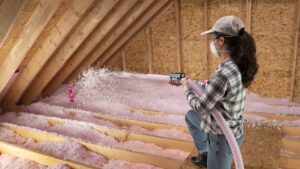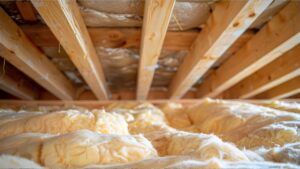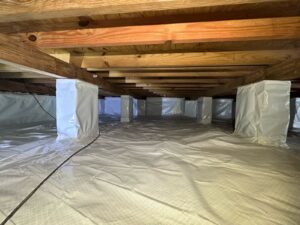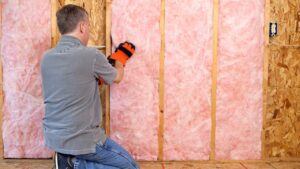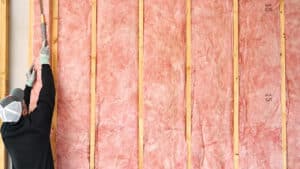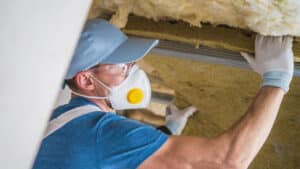Nestled amid the Hampton Roads homes, rodents are harboring a significant threat to home insulation. Unseen and often unnoticed, these pests target not only food sources or trash cans, but the cellulose and fiberglass insulation laid beneath your attic floor and within crawl spaces and attics.
Traces of rat urine, droppings, and waste products signal damage to the thermal insulation of your home, contributing to increasing energy bills and posing serious health risks.
Keep reading to understand how to identify, address, and prevent potential rat infestations in your insulation with the professional assistance of Universal Insulation Doctor.
Will Rats Nest In Your Attic Insulation?

It is a constant conversation with homeowners, cautioning them about the destructive abilities of this furry foe who relishes the fluffy fiberglass insulation in attics as nesting material.
When homeowners overlook the signs of a rat infestation, the problem can quickly spiral out of control. Symptoms of an issue may include scattered rodent droppings, gnawed insulation material, and bite marks on joists and floorboards. Rodent-sourced damage to the home’s exterior, like chewed trash in trash cans, might flag a rodent problem.
Protecting your home requires more than pest control. Universal Insulation Doctor employs a comprehensive rodent control strategy, emphasizing rodent proof insulation as a key element. The experts at this Virginia Beach-based firm utilize tests to assess the air quality post-infestation, shedding light on health risks tied to possible pathogens such as hantavirus in rat urine and waste products.
Universal Insulation Doctor’s prompt and expert insulation removal service ensures minimal energy efficiency loss. They specialize in fiberglass batts and spray foam insulation, championship materials renowned for their heat insulation properties. Choosing the right insulation type, whether it be cellulose, spray foam, or fiberglass, can be the difference between securing your home from repeat business by uninvited rodents or placing a recurrent pest control company on speed dial.
The Impact of Rats on Insulation
The destructive impact of rats on insulation is often underestimated by homeowners across Virginia Beach, Norfolk, and Chesapeake. Rodent damage to home insulation goes far beyond visible gnaw marks. It’s not just nesting materials that rats seek; your insulation is a heat source, a hiding spot, and a food source for these critters.
Rodents, particularly rats, can devastate an attic’s insulation. Tearing through fiberglass batts, burrowing into spray foam, and infesting cellulose insulation with droppings or urine, they compromise the insulation’s function. The resulting loss in thermal insulation capacity can drive up energy bills and make your home much less comfortable.
Beyond the insulation damage, rat infestations also pose serious health risks. Rats leave behind droppings and urine, which can contaminate the air and lead to possible hantavirus infection. Rodent control and removal process should prioritize safeguarding air quality to reduce homeowner’s exposure to such hazards.
We recommend the use of our rodent proof insulation, Pest Guard Insulation as a preventive measure. Our exclusive Pest Guard Insulation service is a cellulose product that we then treat with borate to boost the level of effectiveness. Although this product will not affect wildlife, it will upon contact help control most insects in your attic. This insulation offers a less inviting environment for nesting than traditional fibreglass. The team not only installs new insulation but also fends off potential rodent entry points by caulking crevices, reducing the likelihood of a repeat rodent problem.
Identifying the Problem

Recognizing the problem starts with identifying signs of rat infestation. While pests like termites may leave noticeable damage, rodents are often more stealthy. Rat presence might first be detected by subtle noise in the attic or crawl space, or even unusual pet behavior.
If you suspect insects or rodents, investigate the attic floor and insulation material. Look for signs of rodents like: gnawed insulation, droppings, or nests made of fibreglass batts. If these signs are overlooked, a minor rodent problem may escalate to a troublesome infestation.
Use vigilance in safeguarding potential rodent entry points. Small gaps in the home’s exterior, unfinished caulking jobs, or poorly sealed doors and windows can provide easy access for critters to gain entry. Every crevice counts when it comes to keeping out unwanted guests.
Bringing in a pest control company for an expert evaluation is the safest course of action. We recommend our partners Universal Pest, who are equipped to accurately identify the magnitude of the issue and the most appropriate pest control solution. Trust them for a thorough assessment, leveraging their insulation expertise combined with effective pest control tips.
Professional Assessment and Remediation

A professional assessment determines the extent of the rodent problem and the potential damage to your insulation material. Hire a professional to work on your home. Someone highly skilled in both rodent control and insulation services to provide a precise evaluation. They should have a keen ability to trace rodent entry points that may be missed by the untrained eye.
The insulation removal process follows a thorough investigation. Contaminated material should be eliminated – fiberglass batts, spray foam, or cellulose insulation – ensuring minimal disruption to your home. Your energy efficiency should not be impacted by pest removal but an improvement as insulation is replaced and repaired, lessening the blow to your energy bills.
Once the damaged insulation is removed, the next step is to replace it with rodent-resistant insulation like Pest Guart Insulation, which Universal Insulation Doctor exclusively offers. This not only restores your home’s thermal insulation but also creates an unwelcoming environment for rodents.
Lastly, action is taken to prevent repeat infestations. The team targets potential rodent entry points, sealing them with sturdy materials and measures. They offer a pest control solution that provides peace of mind, ensuring your home in Hampton Roads remains safe from rodents and extensively reducing the risk of future infestations.
Preventative Measures
Preventing rat infestations can save considerable time, effort, and money spent on pest control and insulation repair. Taking proactive measures that fortify the home against potential infestations is substantially easier than tackling established rodents.
Battling rodents extends beyond choosing the right insulation type, such as foam insulation or fiberglass batts. The surroundings of the home also play a role in attracting or discouraging rats. Let’s look at some recommended measures:
| Measure | Description |
|---|---|
| Trash Control | Securing trash cans with tight lids denies rats a food source, making the area less appealing. |
| Pet Food | Storing pet food in airtight containers prevents it from becoming an easy meal for roaming rodents. |
| Garden Maintenance | Keeping gardens tidy reduces hiding spots for rats, deterring habitation. |
| Sealed Entry Points | Filling gaps, crevices and other potential entry points with durable materials minimizes the chances of rodent intrusion. |
Regular insulation checks are advantageous. A quick peek in your attic or crawl space, looking for signs of rodent damage, can allow early detection. Scheduling professional insulation inspections at least once a year for a detailed review.
Remember, the best form of pest control is prevention.
A Note About New Attic Insulation
While all insulation materials have their merits, new advancements cater to the unique needs posed by rodent control. Universal Insulation Doctor brings attention to an emerging favorite: rodent proof insulation. Known for its superior resistance to rodent damage, it’s making a name for itself across Virginia Beach and Norfolk.
Pest Guard Insulation is a superior option for homeowners facing rodent problems. Unlike traditional fiberglass batts or cellulose insulation, our cellulose product is treated with borate to boost the level of effectiveness. This does a great job pro to boost the control of insects in your crawl spaces. It’s an unappealing prospect for the critters and makes their survival in your loft less likely.
The knowledgeable team at Universal Insulation Doctor is adept at assessing which insulation type best fits your needs. Their goal is to keep your home warm, your energy bills low, and the pests at bay. Embracing modern solutions like rodent proof insulation may be a key step towards a rodent-free, comfortable Hampton Roads home.
Call Universal Insulation Doctor for your Home Insulation needs
When it comes to resolving rat infestations and replenishing home insulation, Universal Insulation Doctor is a trusted name in the Hampton Roads area. With a comprehensive suite of services that includes insulation installation, pest control, rodent exclusions, and consultations, they are well-equipped to tackle any home insulation challenges. Their dedicated and experienced team provides peace of mind and expert solutions, leaving your home safe, energy-efficient, and rodent-free.
Universal Insulation Doctor’s approach is unique. They recognize that every home and every homeowner has different needs. So, they offer a range of options for your insulation requirements, from fiberglass batts and cellulose insulation to modern options like rodent proof icynene spray foam insulation.
With Universal Insulation Doctor, customers have noticed not just improvements in home comfort, but also in energy efficiency. A home insulated well, keeping warm in winter and cool in summer, can significantly reduce energy bills, contributing further to your savings. It’s part of their commitment: keeping homes comfortable, energy-efficient, and most importantly, rodent-free.
Trust Universal Insulation Doctor’s expertise to guide you on this journey. Keeping homes in Virginia Beach, Norfolk, and Chesapeake safe and insulated is their top priority. Call them today for a professional, thorough, and reliable service for your insulation and pest control needs.
Do you want to know more about the questions you need to ask your insulation contractor? Read this article to learn more.


